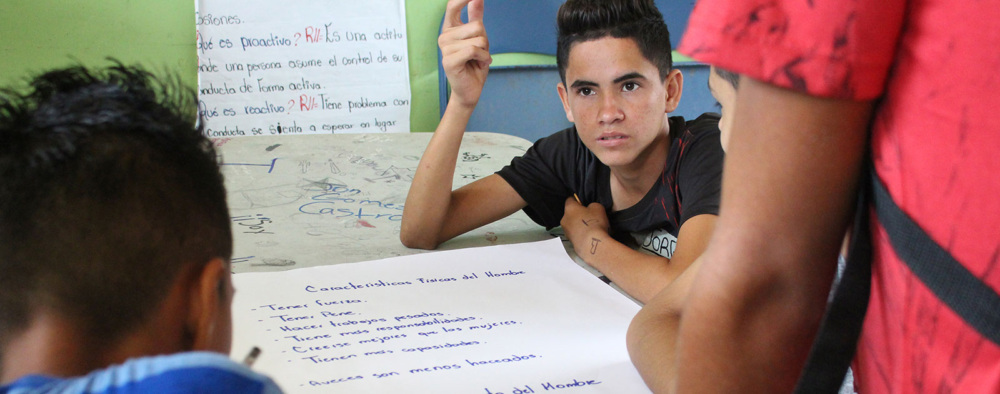
Gender justice
Gender justice
Editor’s note: this post is also available in Spanish.
Patriarchal masculinities – expressions of manhood that promote men’s power and authority over women – fuel gender-based violence worldwide. Combating this global crisis and gender inequalities through girl-centered and girl-led services and programs is essential. But, these efforts must be complemented by specific initiatives for boys and men to challenge harmful masculinity and promote more healthy and equitable gender attitudes and behaviors.
As a partner to community-based organizations that engage with young people around the world, Global Fund for Children is uniquely positioned to support, build upon, and learn from local responses to gender-based violence, including those that promote healthy masculinities.
In this special feature, GFC provides an overview of patriarchal masculinities and explains why locally based organizations are key players in addressing this issue. We also highlight effective local approaches to changing gender attitudes, based on the work of our partners in Latin America. Finally, we examine how GFC supports its local partners to strengthen and expand their efforts.
[image_large][image_caption caption=”A mural made by staff at Centro Integral de Atención a las Mujeres (CIAM) in Cancun, Mexico.” float=””]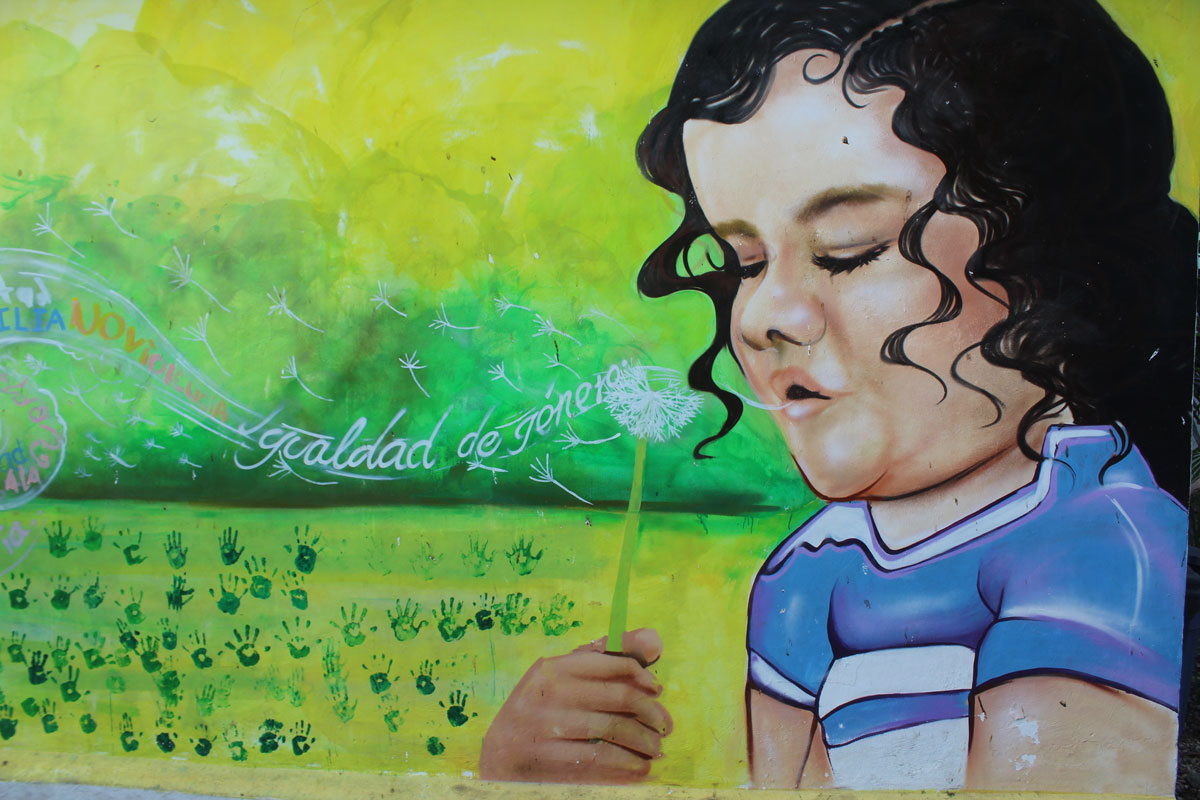 [/image_caption][/image_large]
[/image_caption][/image_large]
The United Nations testified to the connection between patriarchal masculinities and violence in its Declaration on the Elimination of Violence Against Women, asserting that violence against women and girls is “a manifestation of historically unequal power relations between men and women, which have led to domination over and discrimination against women by men.”
One of the most widespread human rights violations in the world, gender-based violence affects women and girls across social, economic, and geographic boundaries. It has many forms – from human trafficking (72% of trafficking victims are women and girls), to child marriage (650 million women and girls around the world were married as children), to female genital cutting/mutilation (which threatens more than 4 million girls each year).
Globally, an estimated one in three women have experienced physical or sexual abuse. Most often, these instances of violence are committed by intimate partners. In 2017, a staggering 87,000 women were murdered worldwide; more than half of these women were killed by an intimate partner or family member.
A global study on gender-related killing found that intimate partner violence is “rooted in widely-accepted gender norms about men’s authority … and men’s use of violence to exert control over women,” and that “men and boys who adhere to rigid views of gender roles and masculinity … are more likely to use violence against a partner.”
The negative impacts of patriarchal masculinities are not limited exclusively to women and girls.
According to Guidelines for Psychological Practice with Boys and Men, published by the American Psychological Association, early exposure to a negative, violent model of what it means to be a man can limit boys’ emotional development. These boys are less likely to engage in healthy behaviors and less likely to seek help – eventually leading to physical and mental health issues such as depression, anxiety, isolation, aggressiveness, and suicide.
A patriarchal model of masculinity based on violence and domination also reproduces and deepens issues that affect people of all genders, such as bullying, homophobia, depression, and harassment.
UNICEF reports that children who grow up around intimate partner violence can suffer a range of severe effects. They are more likely to be victims of child abuse. They are also “more likely to be affected by violence as adults – either as victims or perpetrators.” Violence in the home also denies children their right to a safe home environment.
By perpetuating a cycle of violence in future generations, unhealthy masculinities can also lead to significant economic costs for everyone. The World Bank estimates that violence against women costs some countries up to 3.7% of their national GDP.
[image_caption caption=”Youth holding hands in Mexico. © Rodrigo Alonso Barraza García” float=””]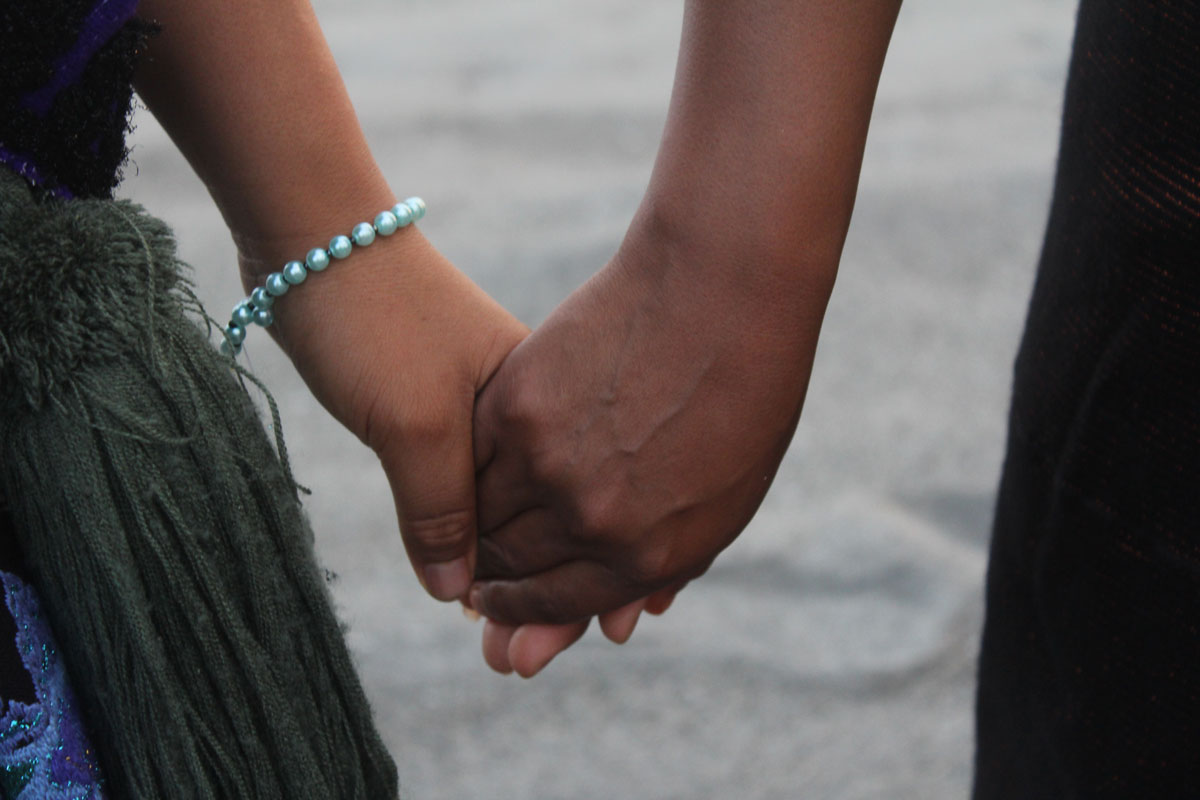 [/image_caption]
[/image_caption]
Combating violence and gender inequalities using a feminist approach – one that centers women’s and girls’ rights, realities, and voices – is paramount. But, these efforts must be complemented by specific initiatives for boys and men to challenge harmful masculinity and promote more caring, healthy, and equitable gender attitudes and behaviors.
Global human rights organizations and assemblies agree on the need to enlist boys and men in these efforts. In 1994, the Programme of Action adopted at the International Conference on Population and Development in Cairo made clear that “men play a key role in bringing about gender equality, since, in most societies, men exercise preponderant power in nearly every sphere of life.”
Adopted in 2012, the UN General Assembly’s Resolution on “Intensification of efforts to eliminate all forms of violence against women” also recognized the critical role of men and boys and civil society organizations – particularly women’s and youth organizations – in making advancements on the issue. The resolutions called upon governments “to fully engage men and boys, as well as families and communities, as agents of change.”
According to the World Bank, the most effective initiatives to combat gender-based violence “address underlying risk factors for violence, including social norms regarding gender roles and the acceptability of violence.” The World Health Organization asserts that in low-resource settings, one promising approach is to “transform harmful gender and social norms through community mobilization and group-based participatory education with women and men to generate critical reflections about unequal gender and power relationships.”
Understandings of gender and masculinity begin forming at a very early age, and continue to evolve over time, influenced by a child’s family, school, peers, and community. The American Psychological Association asserts that “promoting a healthy masculine identity in childhood can influence a ripple effect” that prevents children from perpetuating violence as adults.
Moreover, ideas about masculinities intersect with multiple contextual influences – including race, sexual orientation, socio-economic status, and more. And, while gender-based violence is pervasive around the world, numerous risk factors increase the likelihood that a man will perpetuate violence, including exposure to domestic violence during childhood.
Therefore, it is vital to not only engage boys in developing healthy attitudes about gender from an early age, but also to work with parents and community members to create a supportive environment that fosters equality and nonviolence.
[image_large][image_caption caption=”Young men take part in a workshop on positive masculinities with OYE in Honduras. © OYE” float=””]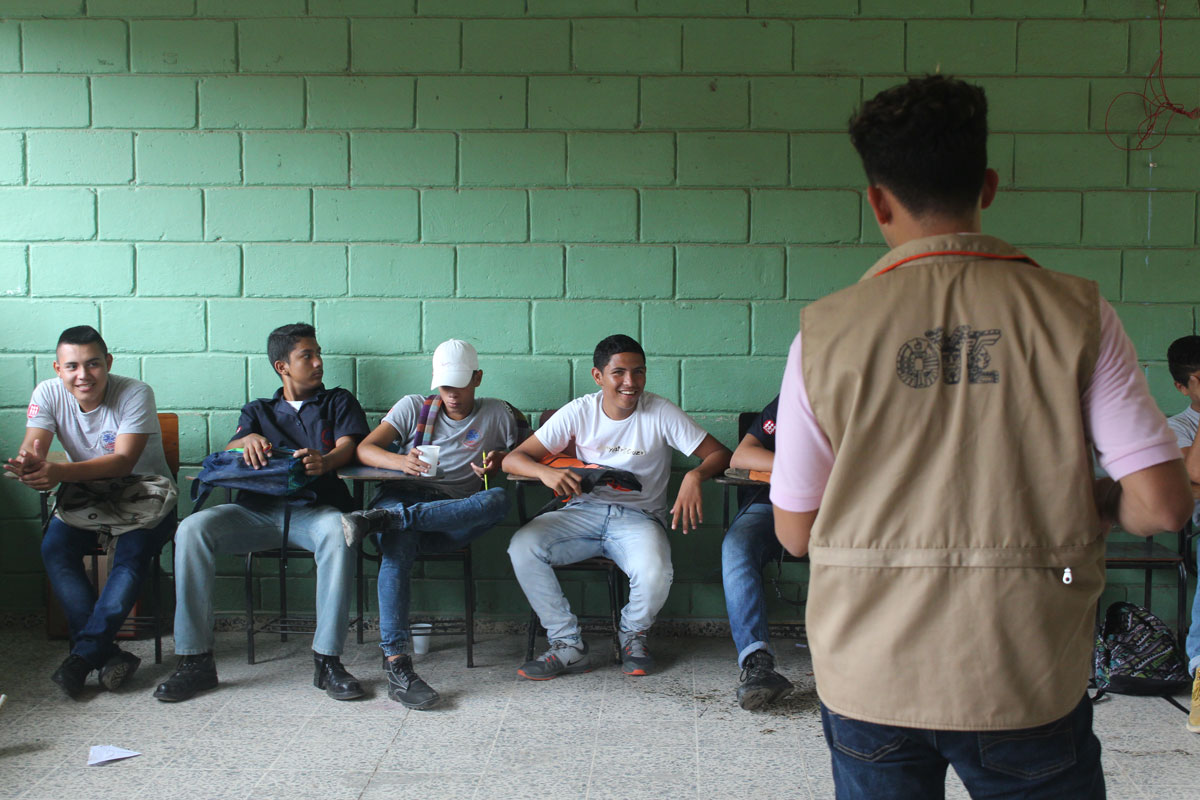 [/image_caption][/image_large]
[/image_caption][/image_large]
Since 1997, we have worked with local leaders to drive social change through programs that are rooted in their communities’ unique needs and context. Through the work of our local partners, we support girls’ education, sexual and reproductive health and rights, redefining masculinity, and the eradication of gender-based violence and harmful traditional practices, including child marriage and female genital mutilation/cutting. Our partners’ strategies engage entire communities – including parents, schools, community leaders, and local and national governments – to work collectively toward gender justice.
Our work on gender equity has spanned more than two decades, including an extensive history of promoting girls’ empowerment in Africa, and our most recent cohort-based initiatives focused on advancing girls’ rights in the Americas and combating child trafficking in India.
In recent years, GFC has increasingly invested in supporting local efforts that engage boys and young men to promote gender equity and healthy masculinities. With a focus on the Americas, we have recently supported 13 organizations using this approach in Guatemala, Honduras, India, Indonesia, Kyrgyzstan, Mexico, and the United Kingdom.
GFC’s primary project that promotes healthy masculinities is Changing Gender Attitudes, Empowering Girls. The initiative supports community-based organizations in Guatemala, Honduras, and Mexico to encourage boys and young men to modify their attitudes and behaviors toward supporting the greater empowerment of girls and young women, leading to healthier and more equitable gender relations.
The initiative is designed to address the deep gender disparities present in our partners’ individual contexts, which include specific and localized manifestations of violence. Their grassroots strategies to build healthy masculinities include:
Experts say that boys who are encouraged to connect with their emotions are less likely to become violent adults. But all too often, social pressure prevents boys from feeling safe and empowered to reflect on and talk about their emotions.
Through specific community interventions, including school programs and participatory training, our partners create environments in which boys can challenge gender stereotypes, express their feelings, and create emotional bonds with other boys.
To multiply the impact of these interventions, our partners often pair these programs with leadership training, encouraging the boys not only to change their own behavior, but to become leaders and role models for other boys in their communities.
In Cancun, Mexico, our partners Centro Integral de Atención a las Mujeres (CIAM) and GOJoven Mexico created community training programs for teen boys, who then replicated workshops and created additional spaces for reflection on alternative models of masculinity.
CIAM specifically works on the promotion of a “culture of peace,” recognizing that patriarchal masculinities are often a risk factor that strongly contributes to violence and social conflict. Its peace clubs use art, community engagement, and dialogue to encourage boys to develop peaceful relationships and resolve conflict nonviolently.
In Honduras, Organización para el Empoderamiento de la Juventud (OYE) facilitates a “Men’s Circle,” where boys and young men can meet to connect with others, share lived experiences and stories, and work on strategies to dismantle and challenge gender-based violence, dominant constructions of masculinity, and oppressive structures in the larger community. The boys also receive training to become community promotors of healthy masculinities.
[image_caption caption=”Youth participants at CIAM in Cancun. © GFC” float=””]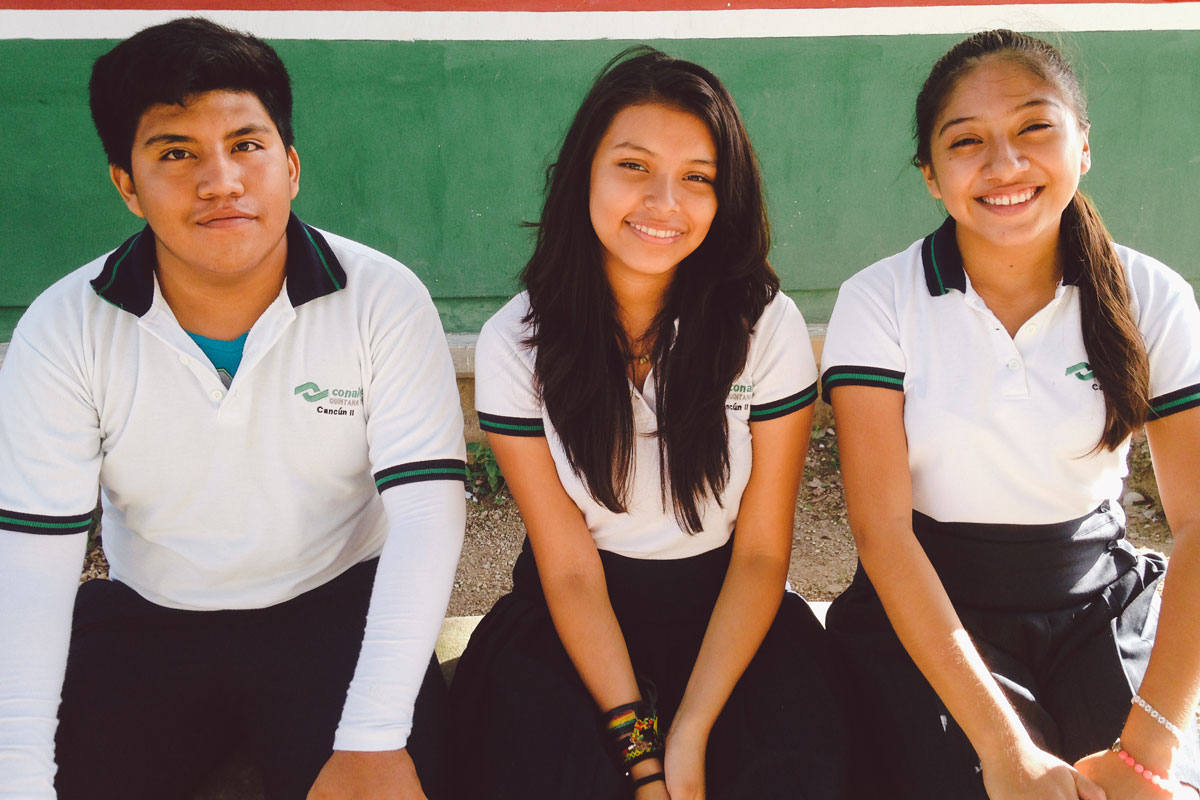 [/image_caption]
[/image_caption]
Gender inequalities and gender-based violence are inextricably intertwined with other forms of inequality and with local realities – not just because multiple forms of discrimination and disparity can deepen power imbalances, but also because patriarchal masculinities often appear masked in cultural practices. Indigenous women and girls, for example, face multiple and unique challenges in realizing their human rights – challenges stemming from high poverty rates, the loss of ancestral lands, globalization, and more. While gender-based violence happens universally, in all communities, it may show up differently in different contexts.
The United Nations Population Fund asserts that “culturally sensitive approaches call for cultural fluency – familiarity with how cultures work, and how to work with them.” Understanding cultural realities can reveal the most effective and respectful ways to identify and challenge harmful practices.
Many of our partners located in the Mayan region are working in partnership with men and boys to identify key drivers for gender inequalities. Many solutions are rooted in ethnic pride and cultural recognition, and they are tailored to local contexts.
For example, in Guatemala, sexual and domestic violence intertwine with ethnic identity and discrimination. Six percent of girls are married by age 15, and more than 4,000 girls aged 10 to 14 give birth each year, especially in rural areas of the country where indigenous populations – who face greater discrimination, poverty, and lack of education – are high. In Chimaltenango, our partner Asociación Generando (ASOGEN) provides culturally sensitive training for indigenous boys and young men, including to relatives of survivors who wish to contribute to the prevention of violence against women.
In Chunhuhub, a Mayan community in Quintana Roo, Mexico, GOJoven Mexico founded the J- Xiibal Collective, a group of indigenous young men addressing masculinities within communal, indigenous, and young men’s environments. For this group, the promotion of healthy masculinities is closely linked with the cultural strengthening of the community. Its training program includes a culturally appropriate curricula and the recovery of the history of the Mayan people.
Boys and men who develop identities based on patriarchal models of masculinity may be ill-equipped to deal with traumatic events in their lives. Whether grappling with forced displacement, domestic violence, illness, the end of a long-term relationship, being victims of a crime, or the loss of a loved one, they struggle to find healthy ways to process these experiences, and often turn to drugs, alcohol, and other harmful behaviors.
Developing a broader understanding of what it means to be a man includes seeking help in the face of adversity. Learning how to ask for help is a critical step in developing healthier behaviors.
In Guanajuato, México, Colectivo SERes works in rehab centers with young men (ages 15-22) with drug abuse problems, helping them to overcome their addictions through psychosocial support and the deconstruction of patriarchal masculinities.
At the southern border of Mexico, the Human Rights Center Fray Matias de Cordova promotes healing circles with migrant boys and asylum seekers. Together, they discuss the role of patriarchal masculinities in their decision-making processes related to migration, and they explore ways to express healthier masculinities in new contexts.
[image_caption caption=”Youth participate in an activity with Red Posithiva in Quintana Roo, Mexico. © GFC” float=””]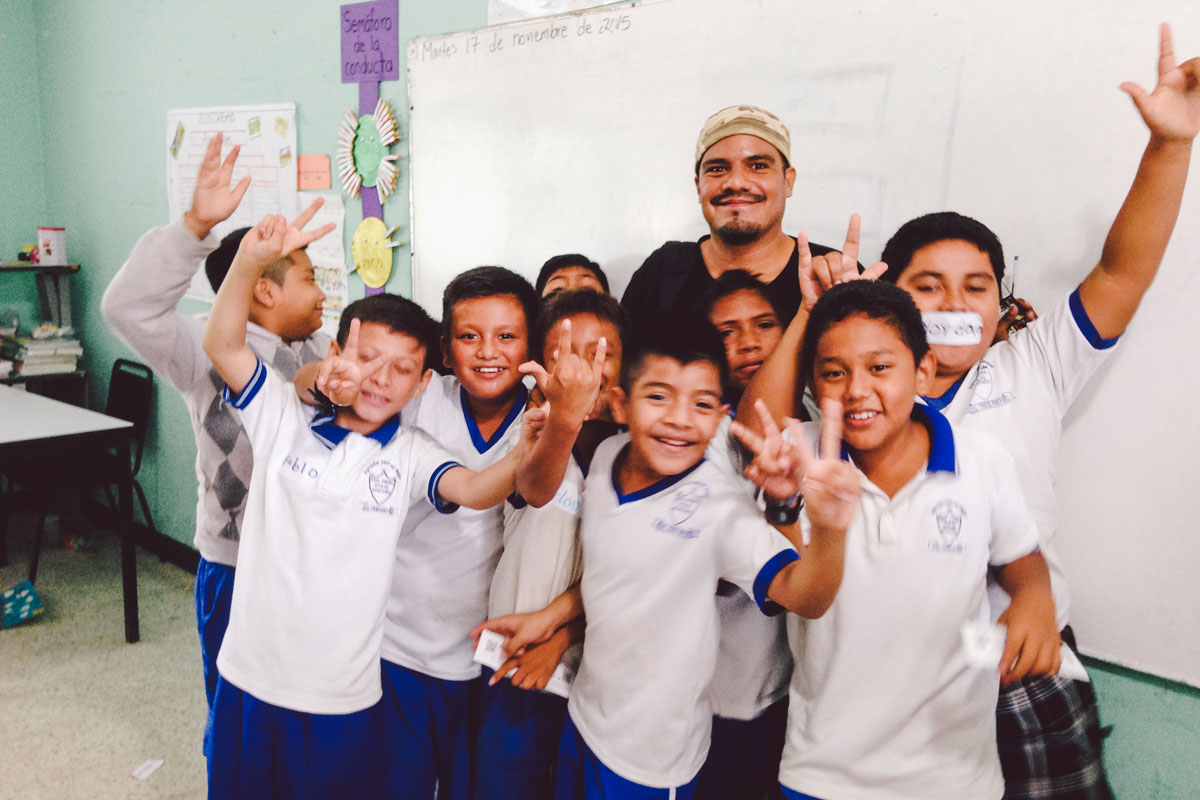 [/image_caption]
[/image_caption]
Educating young people about their sexual and reproductive health and rights is a key strategy in preventing sexual violence and promoting healthier masculinities. Our partners promote comprehensive sexuality education that challenges stereotypes about masculinity and highlights their crucial role in upholding and supporting women’s and girls’ sexual and reproductive rights.
The Mexican state of Quintana Roo ranks first in the country for teen pregnancy, which has become a serious health concern that intensifies multiple gender inequalities, including school dropout and job insecurity. In Cancun, which is located in Quintana Roo, our partners CIAM and México y Caribe Jóvenes work to empower children to talk about gender-related issues and the advantages of delaying parenthood. GFC partner Red Posithiva provides gender and sex education workshops along with individual counseling to students and teachers in secondary schools. Across five years (2015-2019), this approach successfully reduced the number of reported teenage pregnancies in these schools from at least 15 annually to zero.
The MenEngage Alliance reports that policy discussions on the engagement of boys and young men in women’s empowerment are primarily taking place in intergovernmental spaces such as the United Nations, but are not as common in national and local-level policies. Thus, it is important to create and support local agendas toward the promotion of gender justice. The aim is to connect global discussions to local contexts and priorities.
In Honduras, OYE has created open spaces for dialogue with the government, making public policy recommendations for mainstreaming a gender approach. Additionally, OYE has trained a group of promoters of new masculinities who carry out trainings and workshops in Honduras, Nicaragua, and other countries in Central America.
[image_large][image_caption caption=”Youth from OYE in Honduras wearing shirts that say: Machismo culture affects all of us. © OYE” float=””]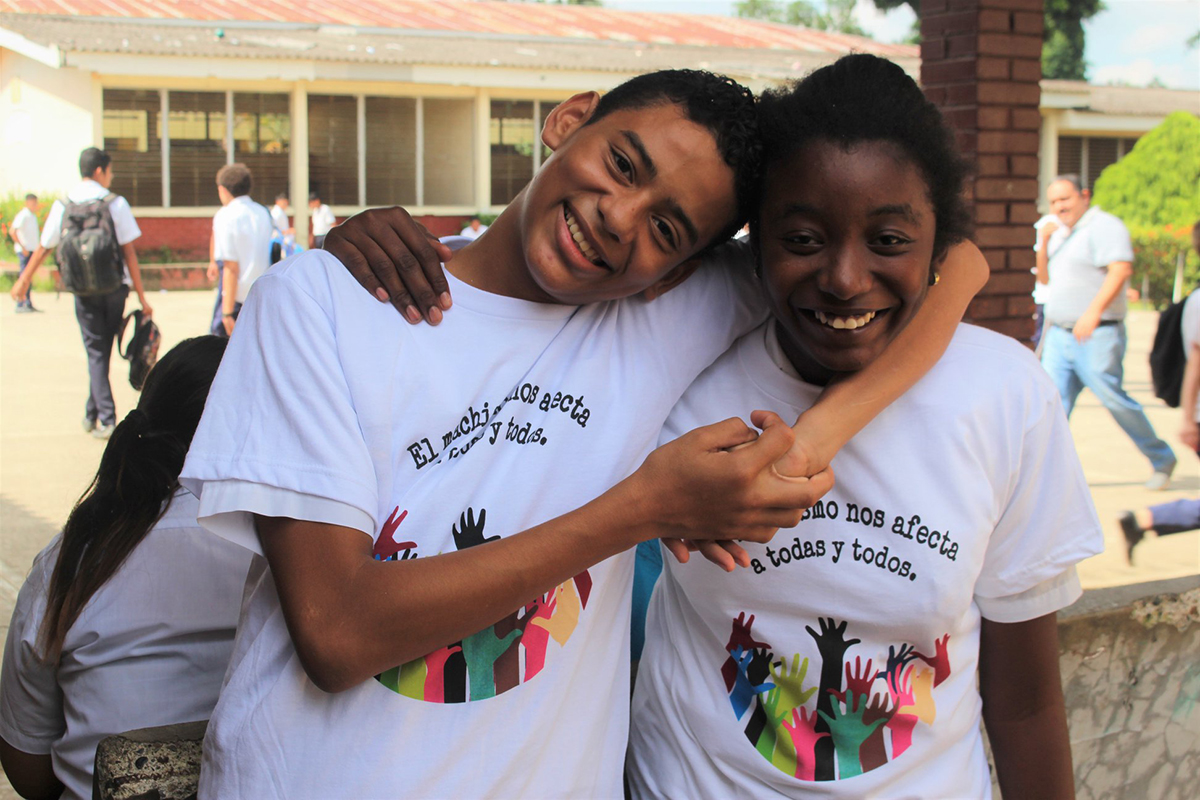 [/image_caption][/image_large]
[/image_caption][/image_large]
In recent years, as more of our local partners expressed an interest in gender and masculinities, they also acknowledged that they lacked the tools or capabilities to build new strategies and programs around this complex issue.
In response, GFC developed a strategy for our work in the Americas – rooted in our long-term, empowering capacity development approach – to support our partners in these efforts. As a partner and funder to hundreds of youth-serving organizations, GFC has an invaluable opportunity to share resources, build connections, and further develop our partners’ capacity around this critical topic.
Our strategy is centered on accompanying and strengthening community-based organizations that work – or are beginning to work – with children and youth from marginalized communities with high levels of sexual and gender-based violence. It consists of three specific components:
We work closely with our partners to help them introduce a gender lens not only to their programming, but also to their organizations as a whole. Our primary goal is to ensure that our partners learn to consider gender beyond individual projects or programs, and begin to link gender to comprehensive, strategic, and sustainable institutional policies and practices.
Based on information gathered during workshops and trainings with our partners, we developed a gender mainstreaming checklist. Gender mainstreaming is a global strategy advocated by the United Nations to achieve gender equality. It seeks to ensure that women and men have equitable access to and benefit from the same resources and opportunities. This includes not only the community, but also the organizational culture of schools, public institutions, and the nonprofit sector.
A gender mainstreaming checklist is an effective tool to help ensure activities, strategies, indicators, project proposals, safety protocols, and internal decisions are implemented in a gender-sensitive and -responsive manner.
By using the checklist, our partners develop a baseline and can track their organizational efforts toward gender mainstreaming. In Honduras, our partner OYE has begun to include participatory and gender-focused planning mechanisms – which include the opinions of the organization’s youth participants – and has made methodological improvements in its gender and masculinities interventions.
In the Changing Gender Attitudes, Empowering Girls initiative, we have also partnered with GENDES, A.C. to help our partners generate impact indicators and outcomes that are specific to their gender and masculinities interventions. With these two tools, our partners are tracking both organizational and programmatic progress with a gender lens.
In addition to helping our partners build their methodological and organizational capacities, we also work directly with our partners to identify needs and opportunities for specific community-based programming that encourages young men and boys to emerge as role models and advocates for gender equity.
These opportunities may include the co-creation of safe spaces for young men and boys interested in reflecting critically on their gender identity and on the violence associated with patriarchal masculinities, or the strengthening of youth promoters who can replicate these conversations in other spaces and with other stakeholders.
We also provide technical support for the development of curricula focused on preventing gender-based violence by working with boys and young men.
[image_caption caption=”The co-creators of the Latin American Network of Masculinities and Youth in Costa Rica.” float=””]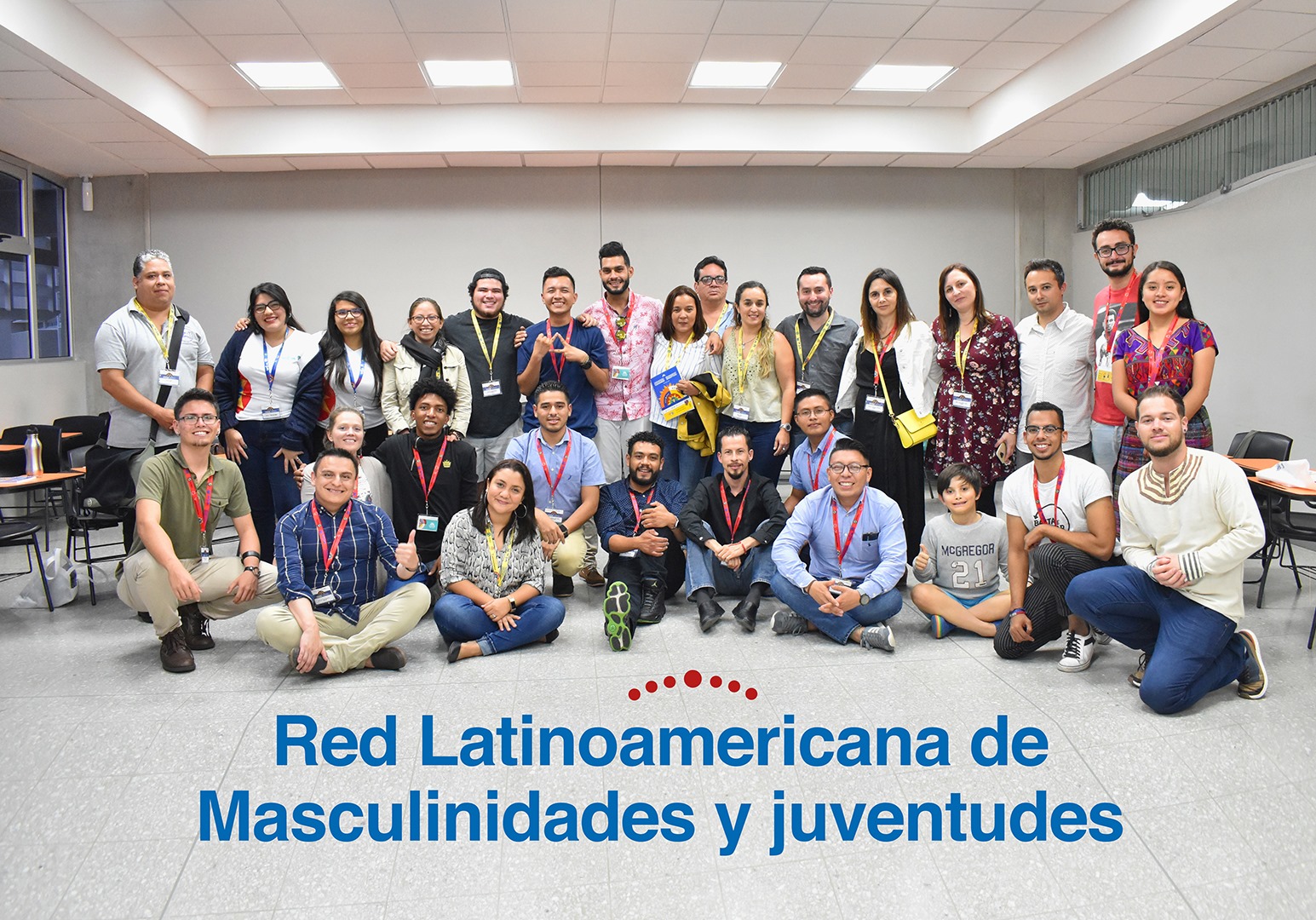 [/image_caption]
[/image_caption]
GFC is an emerging actor in increasing efforts in the Americas to engage men and boys in gender equality; to build and improve the field of practice around engaging men in achieving gender justice; and to advocate with policymakers at local, national, and regional levels.
A core part of our capacity development work is to strategically unite grassroots leaders around mutual challenges, opportunities, and stages of development. Our convenings allow our partners to access and provide support, reflection, training, and technical and issue-area expertise. We also leverage our global network of nearly 700 alumni organizations as peer mentors and advisors. Through these connections, we help our partners move out of isolation and into collective action.
For example, as part of the Changing Gender Attitudes, Empowering Girls initiative, we supported partners to attend two convenings organized by Promundo in Guatemala City. These meetings addressed issues such as sexual diversity, human trafficking, responsible fatherhood, and domestic and sexual violence. Participating organizations, in addition to getting to know each other from one workshop to the next, were able to follow up with each other on the implementation of their work plans.
In 2019, we further brought together 20 partner organizations in Central America to share their experiences working on gender, exposing many to new ideas for working with boys and young men on healthy masculinities. Also in 2019, GFC joined 38 representatives from different groups leading work with youth and masculinities across Latin America in a gathering in Costa Rica that has resulted in the creation of the Latin American Network of Masculinities and Youth, within the Latin American MenEngage Network.
As a co-creator of the Latin American Network of Masculinities and Youth, and in collaboration with the Latin American MenEngage Network, GFC can help to provide a regional platform for grassroots organizations to access new resources, methodologies, and spaces to amplify their advocacy efforts and find support.
[image_large][image_caption caption=”Participants in Equal Community Foundation (ECF)’s Action for Equality program in West Bengal, India. © Equal Community Foundation / Photo by Aravind Hari” float=””]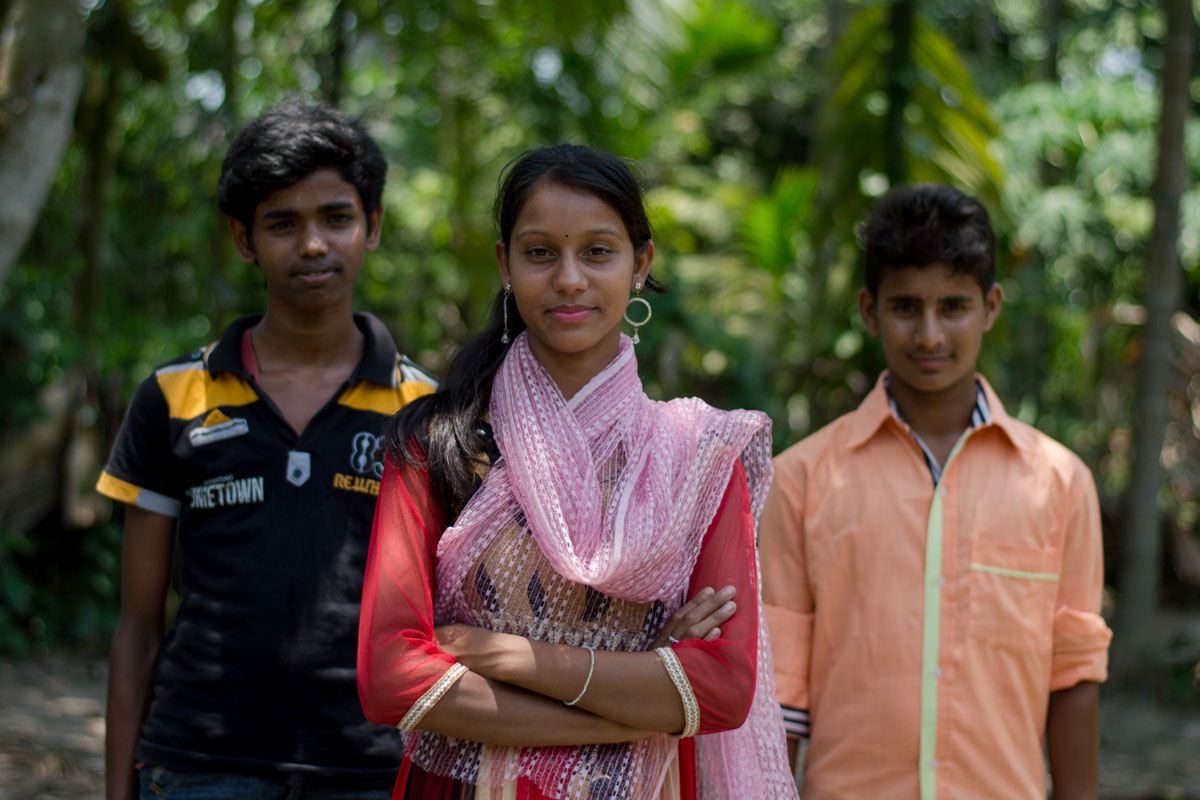 [/image_caption][/image_large]
[/image_caption][/image_large]
As part of its gender and masculinities strategy, Global Fund for Children will continue its focus on Central America and Mexico. We will continue to offer our partners a combination of flexible funding, capacity development support, and learning opportunities, with the overarching aim of equipping partners to better integrate positive masculinities and gender strategies that are inclusive of boys.
While we continue to support our current partners, we also hope to launch our next cohort of gender- and masculinities-focused partnerships over the next two years.
In 2020, in collaboration with the Latin American MenEngage Network, GFC will co-design a gender and masculinities convening in Mexico with our current partners working on this theme to strategically bring together young leaders around mutual challenges, learnings, and opportunities for collaboration.
GFC will also continue to support the newly formed Latin American Network of Masculinities and Youth, alongside GFC’s partner GOJoven Mexico, which serves as the network’s Mexico representative, as members take steps to consolidate the network and create a joint agenda for collaboration. These efforts are spearheaded by GFC Program Officer Rodrigo Barraza, who holds a PhD in gender studies and has extensive experience working with youth and youth-serving organizations throughout the region.
At the same time, GFC is seeking opportunities to expand this work in Bolivia, Brazil, Colombia, and Peru, as well as in regions beyond the Americas.
For example, GFC has long-term partners in India and Pakistan that have been deeply engaged in transforming power dynamics that lead to gender inequality. We have a number of partners in Africa that increasingly recognize the importance of working with men to challenge norms that lead to violence against girls. In the UK, we are seeking to build a cohort of partners that encourage boys to reflect on masculinity and change their behaviors.
We look forward to joining forces with more partners around the world who are engaging boys and young men, together with girls and young women, to advance gender justice.
